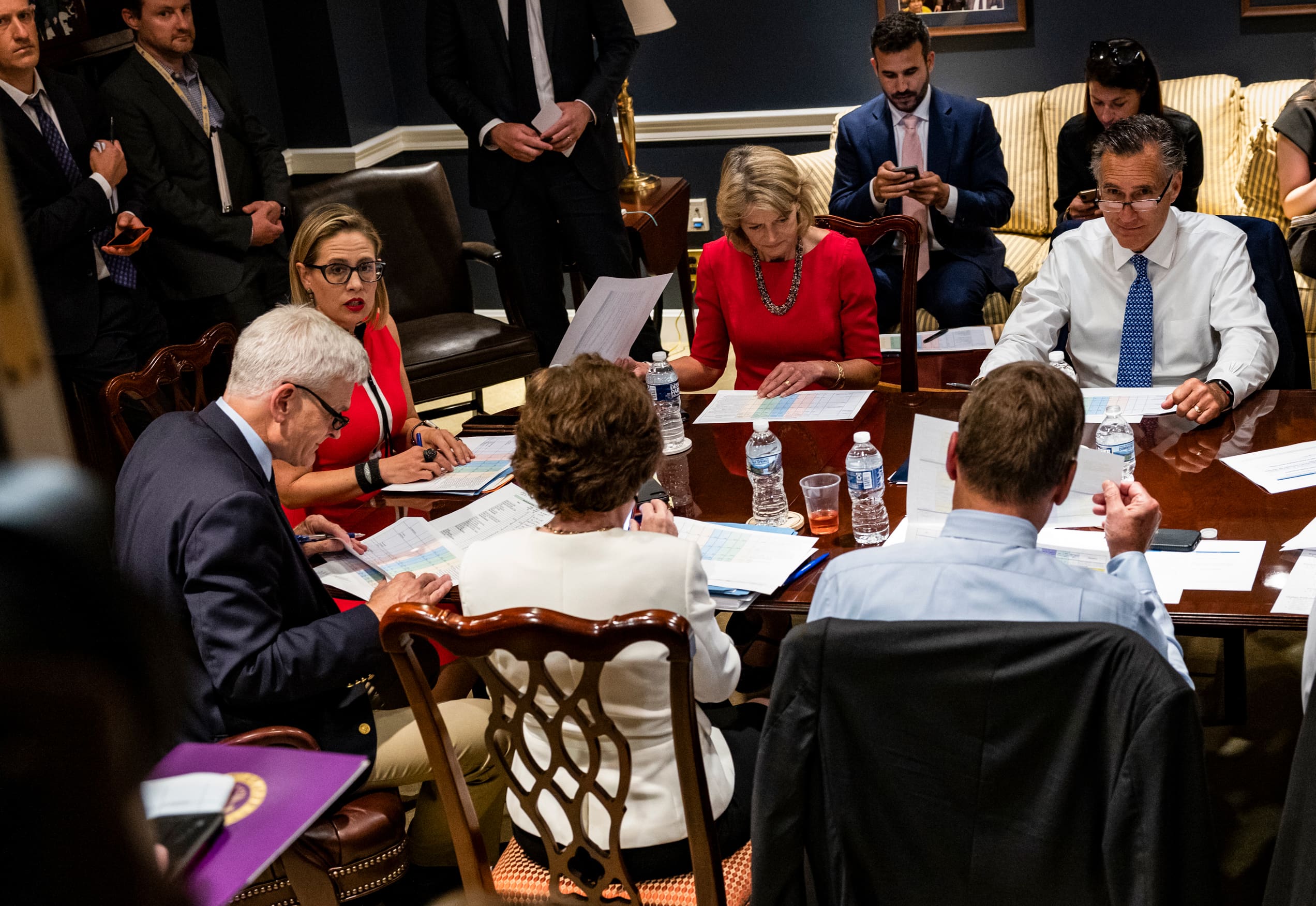Bipartisan Senate group reaches infrastructure deal without tax hikes — but leaders still need to sign off

Senators from both parties have reached an infrastructure deal they hope to sell as a plan that can get through Congress with bipartisan support.
A group of 10 Democrats and Republicans struck what they called a "realistic, compromise framework to modernize our nation's infrastructure and energy technologies," according to a joint statement released Thursday by Sen. Kyrsten Sinema, D-Ariz. The plan "would be fully paid for and not include tax increases," the senators added.
"We are discussing our approach with our respective colleagues, and the White House, and remain optimistic that this can lay the groundwork to garner broad support from both parties and meet America's infrastructure needs," the lawmakers said.
The senators have tried to craft their own plan after infrastructure talks between President Joe Biden and Sen. Shelley Moore Capito, R-W.Va., collapsed. While the 10 lawmakers agreed to a deal, they still face a challenge in trying to win support from the White House and congressional leaders to make their proposal law.
The senators briefed Minority Leader Mitch McConnell on the plan Wednesday, and the Kentucky Republican was "open" to it, GOP Sen. Mitt Romney of Utah told reporters Thursday. It is unclear now if the package will be comprehensive enough to appease Senate Majority Leader Chuck Schumer, D-N.Y., House Speaker Nancy Pelosi, D-Calif., and Biden.
"The President appreciates the Senators' work to advance critical investments we need to create good jobs, prepare for our clean energy future, and compete in the global economy," deputy White House spokesperson Andrew Bates said Thursday evening in a statement. "Questions need to be addressed, particularly around the details of both policy and pay fors, among other matters."
Bates said the White House would work with the senators in the coming days on a path forward
The White House has faced backlash from progressives who do not want the president to abandon Democratic priorities in order to pass a bill with Republican votes.
While the senators said they have agreed on the thorny issue of how to pay for infrastructure, the funding methods could still divide lawmakers. Biden and Democrats have called to raise the corporate tax rate to offset investments, but Republicans have said they will not reverse their 2017 tax cuts. The White House wants to hike the corporate rate to at least 25% from the current 21%.
Earlier Thursday, Sen. Jon Tester — a Montana Democrat who has joined the negotiations — suggested the funding for the plan could come from multiple sources.
"Part of what I'm concerned about is that maybe what we're projecting on the numbers, on the pay-fors, because they're not taxes. They're fees. They're funds. They're different vats of money out there, or pots of money out there, that we can draw out of," he told MSNBC.
The White House has stayed in touch with the Senate negotiators as Biden targets an infrastructure bill as his second major legislative initiative. The president first put forward a $2.3 trillion plan, but scaled back his offer to $1.7 trillion during talks with Capito.
Biden has asked for at least $600 billion in new spending above the baseline already set by Congress, Sen. Bill Cassidy, a Louisiana Republican involved in the talks, told reporters.
Although they control both chambers of Congress, Democrats face a complicated path toward passing an infrastructure plan. While they can approve a bill on their own in the evenly divided Senate through budget reconciliation, they have to keep all 50 members of their caucus on board.
Sen. Joe Manchin, D-W.Va., has insisted he wants to pass a bill with support from both parties. He could hold up a Democratic proposal on his own. Manchin is part of the negotiating group.
The bipartisan House Problem Solvers Caucus released its own infrastructure plan this week. The proposal would cost $1.25 trillion, including $762 billion in new spending. The group did not say how it would pay for the investments.
Meanwhile, the House has moved forward with a five-year, $547 billion surface transportation funding bill that Democrats could use to pass major pieces of Biden's infrastructure plan. House Majority Leader Steny Hoyer, D-Md., said Thursday that Democrats aim to vote on the legislation as soon as the end of the month.
Biden's initial plan called for a range of investments in clean energy, housing, schools and care for elderly and disabled Americans, all of which Republicans have called unrelated to infrastructure.
Subscribe to CNBC on YouTube.
Source
Check Our More
No comments